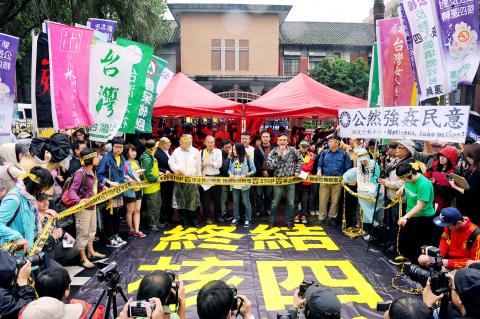More than 200 people protested in front of the Legislative Yuan in Taipei yesterday morning against the question proposed by Chinese Nationalist Party (KMT) legislators for a referendum to decide the fate of the Fourth Nuclear Power Plant in New Taipei City’s (新北市) Gongliao District (貢寮).
Chanting “pro-nuclear legislators are distorting the referendum, conforming to the political party and acting against the public will” and “holding a bird-cage referendum is fake democracy,” the protesters tied yellow ribbons that read “Terminate the Fourth Nuclear Power Plant and reject dangerous nuclear power” on the fence of the Legislative Yuan.
A referendum proposal, co-sponsored by 32 KMT lawmakers and led by Lee Ching-hua (李慶華), framed the question as “Do you agree that the construction of the Fourth Nuclear Power Plant should be halted and that it not become operational (你是否同意核四廠停止興建不得運轉)?”

Photo: CNA
“The referendum question should be phrased to reflect the stance of those who posed it, meaning that since the KMT and the Cabinet are in support of the construction, the question should be ‘do you agree to continue the nuclear plant construction project?’” Green Citizen Action Alliance deputy secretary-general Hung Shen-han (洪申翰) said.
“The referendum should be held for the public to verify the government’s policy, but now it is using the opposing side’s opinion of ‘halting the construction’ as a question for referendum, which is violating the principle of responsible politics,” he added.
Among the protesters were film directors Wang Shau-di (王小棣), Cheng Yu-chieh (鄭有傑) and Ko I-Chen (柯一正).
Wang said she did not trust the government because it did badly on basic issues and that “the government did not even do a good job ensuring the basic safety of the nuclear power plants and spent nuclear fuel, nor did it answered to the public on these basic issues.”
“The government never communicated with the public and has no direction for the future,” she added.
Handing out papers with pro-nuclear legislators’ office phone numbers on them and urging the public to call them to voice their anger, the protesters urged the legislators not to obey the political party’s orders, but to listen to the public.

Taiwan has received more than US$70 million in royalties as of the end of last year from developing the F-16V jet as countries worldwide purchase or upgrade to this popular model, government and military officials said on Saturday. Taiwan funded the development of the F-16V jet and ended up the sole investor as other countries withdrew from the program. Now the F-16V is increasingly popular and countries must pay Taiwan a percentage in royalties when they purchase new F-16V aircraft or upgrade older F-16 models. The next five years are expected to be the peak for these royalties, with Taiwan potentially earning

STAY IN YOUR LANE: As the US and Israel attack Iran, the ministry has warned China not to overstep by including Taiwanese citizens in its evacuation orders The Ministry of Foreign Affairs (MOFA) yesterday rebuked a statement by China’s embassy in Israel that it would evacuate Taiwanese holders of Chinese travel documents from Israel amid the latter’s escalating conflict with Iran. Tensions have risen across the Middle East in the wake of US and Israeli airstrikes on Iran beginning Saturday. China subsequently issued an evacuation notice for its citizens. In a news release, the Chinese embassy in Israel said holders of “Taiwan compatriot permits (台胞證)” issued to Taiwanese nationals by Chinese authorities for travel to China — could register for evacuation to Egypt. In Taipei, the ministry yesterday said Taiwan

Taiwan is awaiting official notification from the US regarding the status of the Agreement on Reciprocal Trade (ART) after the US Supreme Court ruled US President Donald Trump's global tariffs unconstitutional. Speaking to reporters before a legislative hearing today, Premier Cho Jung-tai (卓榮泰) said that Taiwan's negotiation team remains focused on ensuring that the bilateral trade deal remains intact despite the legal challenge to Trump's tariff policy. "The US has pledged to notify its trade partners once the subsequent administrative and legal processes are finalized, and that certainly includes Taiwan," Cho said when asked about opposition parties’ doubts that the ART was

If China chose to invade Taiwan tomorrow, it would only have to sever three undersea fiber-optic cable clusters to cause a data blackout, Jason Hsu (許毓仁), a senior fellow at the Hudson Institute and former Chinese Nationalist Party (KMT) legislator, told a US security panel yesterday. In a Taiwan contingency, cable disruption would be one of the earliest preinvasion actions and the signal that escalation had begun, he said, adding that Taiwan’s current cable repair capabilities are insufficient. The US-China Economic and Security Review Commission (USCC) yesterday held a hearing on US-China Competition Under the Sea, with Hsu speaking on